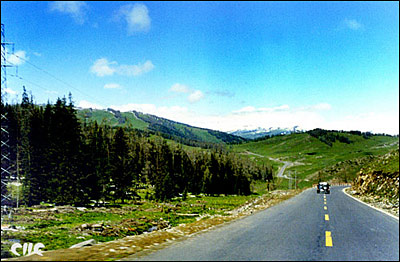The building of highways is seen as key to accelerating
infrastructure construction. In 2003, completed investment in
highway construction was 350 billion yuan and 219 key highway
projects progressed, focusing mainly on the five north-south and
seven east-west national arterial highways as well as highways in
western China and in rural areas. By the end of 2004, the total
length of highways open to traffic reached 1.871 million km,
including? 34,300 km of expressways up to advanced modern
transportation standard, ranking second in the world. The nation's
highway density has now reached 19.5 km/100 sq km.?
With the completion in 2008 of the five north-south and the seven
east-west national arterial highways, totaling 35,000 km, Beijing
and Shanghai will be linked by major highways, chiefly expressways,
to the capitals of all provinces and autonomous regions of China,
creating highway connections between over 200
cities.??
The aim of the National Expressway Network Plan approved in early
2005 is an expressway system connecting all capitals of provinces
and autonomous regions with Beijing and with each other, linking
major cities and important counties. The network will have a total
length of about 85,000 km, including seven originating in Beijing;
the Beijing-Shanghai, Beijing-Taipei, Beijing-Hong Kong-Macao,
Beijing-Kunming, Beijing-Lhasa, Beijing-Urumchi, and Beijing-Harbin
expressways. Half of the projects are already underway.
 |
 |